There is no denying the global machinations of social media has something for everybody. But what about when a gargantuan social media platform like Facebook, with a purported 2 billion subscribers, seems to drive liberal-minded content over conservative-view material? Does Facebook spoon-feed material so that you see what it wants you to see thus pulling political strings? If so, is Facebook skewing partisan strength?
According to a new study published by Western Journal—a conservative media site—Facebook is tweaking what is shared upon its platform via algorithm constructs. Natural News reported, “For weeks now conservative and independent media outlets have been screaming that Facebook and other social media giants were deep-sixing their content and dramatically curbing their reach to just a small fraction of their followers.”
Per D.C. Clothesline, “traffic to liberal websites has increased two percent in the month since Facebook implemented its new algorithm, while traffic to conservative sites has tanked 14 percent.” What is behind the percentage differentiation? Is Facebook largely driving viewers away from the Right and steering more traffic to the Left?”

In January 2018, in yet another maneuver by Facebook, the social media giant implemented an all-new algorithm whereby it reportedly enhanced “friends, family, and groups” tailored to its consumers. Like packaged goods Facebook felt you faithfully deserved, more of these three categories and less of everything else was to be delivered directly to whatever electronic device one used. But it is that last class—”groups”—which may be a bit dubious. Put another way—a tad less Trump-ish for conservative folks and more “Hillary in 2020” for the Left.
That being the alleged case, conservative-oriented media entities were, in effect, deprived better audience-reach potential. As Fox News anchor Tucker Carlson said on his Friday night show, what Facebook is allegedly doing is “a form of social control” via social media. Carlson went on to label the Facebook schematic a blueprint of “ideological warfare.”
Even if Facebook did not intend the diminished results for media entities with conservative perspectives, Western Journal‘s editor, George Upper, offered the following distinction: “This algorithm change, intentional or not, has in effect censored conservative viewpoints on the largest social media platform in the world. This change has ramifications that, in the short-term, are causing conservative publishers to downsize or fold up completely, and in the long-term could swing elections in the United States and around the world toward liberal politicians and policies.”
Before, during and after the 2016 presidential election cycle, we saw report after report more than hinting at the realm of media bias. Although Facebook is a social media and not a media outlet, it nevertheless serves up every single existing media enterprise on the planet. Sign-on and scroll to see for yourself. Therefore, it would seem its superpower engine can be quite the catalyst in terms of icing the cake and serving larger portions to whomever it wants while depriving others whose personas (campaign platforms) are deemed out of alignment.
On May 10, 2016, The Federalist published a story on the exact same topic involving Facebook’s manipulations and, well, fixing things to fit agendas. Sean Davis wrote, “The Facebook executive who oversees the Trending Topics product for the social media giant is a big Hillary Clinton donor, public records show. Facebook is currently under fire for deliberately blacklisting and censoring conservative outlets and news topics. According to a former ‘news curator’ tasked with managing the Trending Topics feed, Facebook’s deliberate blacklisting of legitimately trending topics ‘had a chilling effect on conservative news.'”
Per Engadget, Facebook co-founder Dustin Moskovitz pledged to donate $20 million to democratic president nominee Hillary Clinton’s campaign and other Democratic election efforts [in the 2016] election year.” Mr. Moskovitz was rather emphatic when in 2016 he wrote, “If Donald Trump wins, the country will fall backward.”
Here we are almost two full years later, and the article you are reading echoes the one published in The Federalist. And the Facebook volcano has been bubbling and rumbling all week.
Today, DC Clothesline‘s Jake Anderson wrote: “The salient facts of the new Cambridge Analytica scandal are bad, and the optics are even worse for Facebook, which is already facing multiple battles both in legal courts and the court of public opinion. But this really is just the spilled pot of a long-boiling problem: growing discomfort within our citizen-consumer class over predatory data mining and the unaccountable shadow agencies and corporations being given access to our private lives via social networks. Big Brother has been privatized, and it may turn out to be far more dangerous than anything George Orwell predicted.”
The Cambridge Analytica scandal he is referring to is the namesake of a UK-based political consulting firm which, according to the latest reports, was handed-over profiles of 50 million Facebook subscribers with Mark Zuckerberg’s knowledge. In effect negating 50 million privacy expectations via Facebook’s promissory agreements. Sell-out?
According to Tom Warren, the flip-side to this controversial coin has a lot to do with “permissions” granted Facebook when a user signs up for an app. Mr. Warren claims he received the following text in an email from a Facebook software engineer, lambasting him for writing an article against Facebook’s role in subscriber data uses: “Your post of fb collecting call history and sms text is pretty dirty. You’re turning a messenger/fb feature into a smear campaign. The app clearly ask[s] for permission to read these data. Your article takes stupid audience reaction and spin[s] it as controversy.” True or not, always read what you are consenting to.
Despite careful analysis and reading fine print whereby users are granting “permissions” to Facebook, Jason Veley claims Facebook has a file on users who don’t even have Facebook accounts, with information ranging from the banal to the bills. Mr. Veley wrote, “In addition to seeking out conservative users and censoring their content, Facebook also collects personal information from everyone on the Internet, regardless of whether or not they have a Facebook account.” Wowza!
Recode reported on the controversial “revelations that a political data firm called Cambridge Analytica absconded with the data of 50 million unsuspecting Facebook users, which Facebook knew about but kept secret.” Facebook damage control designees finger-pointed via full-page ads it purchased over the weekend. Those ads claim a research university professor who was privy to the 50 million Facebook users’ information “leaked Facebook data of millions of people in 2014.” (“Millions” could mean two million whereas we now know it was a definitive 50 million. Love how they squelch the static they created!)
A full page ad in The Observer today — an apology from Facebook. A week after Facebook threatened the newspaper with legal action about the story exposing Cambridge Analytica’s use of Facebook data. pic.twitter.com/lJte7hh0tT
— Donie O'Sullivan (@donie) March 25, 2018
The research professor Facebook is blaming for the data-sharing privacy-exploiting debacle has retorted, claiming he is being made “a scapegoat” by Facebook executives.
Is Facebook’s engineering equitable? Is it fair? It’s rhetorical; of course it isn’t, whether Hillary Clinton or Donald Trump were better benefactors or not. If you look at it in the context of using its website however it chooses to, the question remains as to where consumers divert to get their news, the unbiased brand.
Personally, my Facebook time is accompanied by due diligence in my quest for authentic news not saturated in media-bias marinade. Aware of and affiliated with reputable, unbiased, authentic news-commentary sources such as OpsLens et al., my eyes read trusted media entities reporting fact-patterned analyses.
On March 23, The Guardian published findings claiming Cambridge Analytica was seemingly in Trump’s corner: “The blueprint for how Cambridge Analytica claimed to have won the White House for Donald Trump by using Google, Snapchat, Twitter, Facebook and YouTube is revealed for the first time in an internal company document obtained by the Guardian.
“A former employee explained to the Guardian how it details the techniques used by the Trump campaign to micro-target US voters with carefully tailored messages about the Republican nominee across digital channels,” wrote Paul Lewis and Paul Hilder.
Indemnifications and benefactors aside, the scores of information used by Cambridge Analytica was made possible by one source forking it over: Facebook.
Given political bias ostensibly seasoned with a heaping of hubris, did Mark Zuckerberg and Facebook executives foresee a different outcome? Was there that much of an abundance of confidence that Hillary Clinton would prevail? Utter shock that Donald Trump won the White House was replete in news cycles during post-election analyses. The excuses from Mrs. Clinton and others still reverberate to some extent.
Speaking of marinade, where has Facebook birther Mark Zuckerberg been stewing during this week’s blowup regarding the social media goliath “data mining” your, mine, our online activities and personal information, ultimately making Facebook billions in revenue? Indeed, WIRED wrote a piece titled “The Irreversible Damage of Mark Zuckerberg’s Silence” and I’ll bet that gave Facebook investors migraines.
Writing for Money.com, Laurie Segall wrote, “The company is facing multiple uphill battles, from fake news to Russian trolls’ weaponization of the platform to the latest controversy, over Cambridge Analytica and user data.”
Dylan Byers, also writing for Money.com, elucidated rather pointedly: “The scandal also highlights a problem that is built into the company’s DNA: its business is data exploitation. Facebook makes money by, among other things, harvesting your data and selling it to app developers and advertisers.”
Whether you agree or not with those last few assertions, it sure lends to Facebook’s thematic approach of “bringing people together”…but at a cost to you and a huge profit for Zuckerberg’s Facebook and those who control marionette strings.
Although we are not solely concentrating on Facebook’s data mining dustup, Byers words are prime and seemingly correlate to the topic at-hand: deliberateness for a vat of gain, heavily seasoned with bias. In our study, it is political bias.
What particular kind of forensic scientist or criminologist or journalist investigates such claims?
Enter Steve El-Sharawy, noted media data analyst. Putting Facebook under his scope, El-Sharawy said, “The result of the US Presidential election should never have been a shock. Facebook data clearly showed the popularity of Trump and the rise of a plethora of news sources outside of the mainstream – if you knew where to look. People have heard the term ‘filter bubble,’ but what are its effects on a macro level? Step behind the curtain of the Facebook newsfeed algorithm and see how it has changed the entire media landscape of the US and beyond.”
A “filter bubble” is an “algorithmic bias that skews or limits the information an individual user sees on the Internet.”
Analyzing billions of data rows, El-Sharawy exposed “the pattern of polarization across US media both before and after the 2016 Presidential election.”
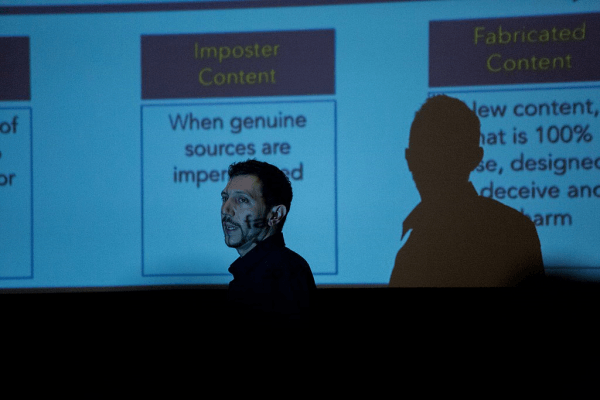
Mr. El-Sharawy concentrated on “Imposter Content” and “Fabricated Content,” both rather self-explanatory factors culminating in the algorithm engineered and steered by Facebook. In all of this, I can’t imagine overcoming a deeply troubled reputation at this point. Are we looking at a candle flicker in the rain? Is the Facebook honeymoon over?
On March 21, 2018, the Media Research Center focused on a recently-released study conducted by McLaughlin and Associates which purports the pulse concerning Americans and “liberal bias.” MRC’s executives contend the “American public is repulsed by the constant and blatant propaganda being pushed by the entertainment and sports media. What’s more: it’s driving audiences away.” Reckoning that Facebook can be classified as “entertainment media” lends to our discussion.
Brent Bozell, MRC’s president said, “Many people have speculated that it is the liberal politics in sports and entertainment shows that is driving their audiences away. We now have evidence that proves this is true. 75% of likely voters agree that political commentary should be left out of entertainment and sports TV. It is no coincidence that viewership of this year’s Oscars ceremony hit an all-time-low.” He has a valid point. Watching any of the celeb awards shows may give one the feeling that they are viewing an alternate version of Facebook Live, awarding political slants over playwright prose or big-screen rivet.
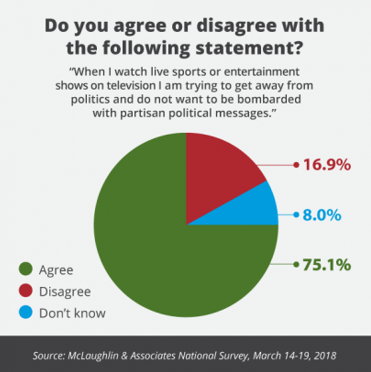
When one or more stars and celeb extraordinaires boast left-leaning political diatribe at the Oscars podium, criticisms come, linger a few days at best, and then melt away. When a political view which happens to be spoken (posted) by a conservative, the Facebook clink is the sentence deemed necessary by Facebook security forces. And I’m going by real-life examples experienced by “Friends” who have been barred for their conservative political ideologies.
Facebook Jail
Policing their own territory, folks at Facebook censure what they deem is appropriate and what is not. Informally called “Facebook Jail,” several of my conservative friends have been thrown in the Facebook slammer for the typical 30-day time-out. In each and every case, any of the aforementioned Facebook violators/recidivists posted materials pertaining to pro-President Trump and/or anti-Obama or anti-Clinton etc.
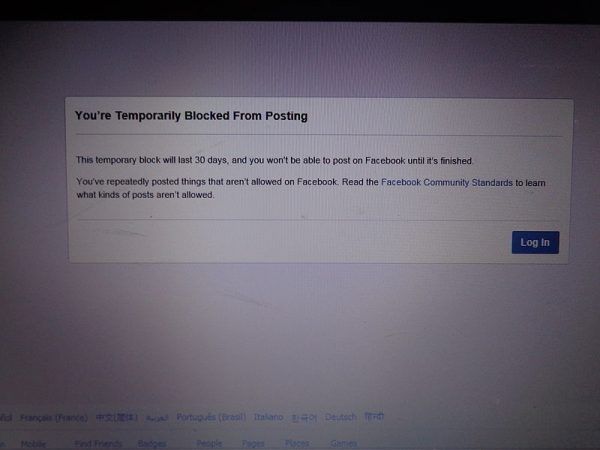
Fortuitously or not, some cohorts of mine aligning with Democrats and liberalism have either never been subjected to Facebook Jail or simply kept it hush-hush if they had. That may warrant further study of its own, but I suspect Facebook is not going to offer-up any data for the cause.
Although Facebook gets to control things from their wheelhouse—it is their baby—it can not censure or prohibit others using their brand of medicine while not on Facebook’s site. Depicted below is a too-the-point graffiti piece exemplifying the sentiment of how some view Facebook’s machinations controlling what we see and thus how our behavior and decision-making may be influenced.
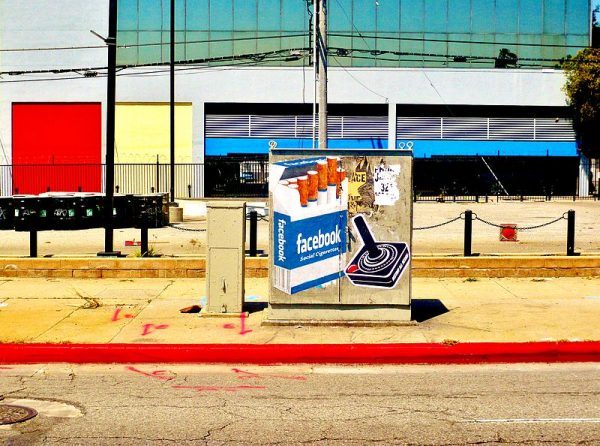
Great artwork and a pointed message for both conservatives and liberals to see (although more liberals will be exposed to this since it is in California).
Whilst researching this subject matter, I came across a piece of material which alleged that Brian Acton, the pioneer, visionary and co-founder of WhatsApp (which he sold to Facebook for $19 billion) embarked on a campaign to #deletefacebook. Simple and clever, in light of all the swirling innuendo and official statements indicating varying members of the US House and Senate are piqued by Facebook’s reach, alleged monopolization and, as of late, data mining allegations encroaching on citizens’ privacy having impacts on our nation’s election process.
Thank you @SenJohnThune and @SenBillNelson for granting my request for a hearing on #CambridgeAnalytica and @Facebook. It’s time for Mark Zuckerberg to come give the American people the answers they deserve.https://t.co/e9X0kssqSK
— Ed Markey (@SenMarkey) March 23, 2018
Fortune published the significant burdens weighing on the back of Facebook, notably lawsuit threats from its investors as well as regulatory impositions from the governments of the United States and United Kingdom.
Whether one views the numbers marginally or substantively, a graph produced in the McLaughlin & Associates study shows the breakdown pertaining to social media patronage by political affiliation, gender and age:
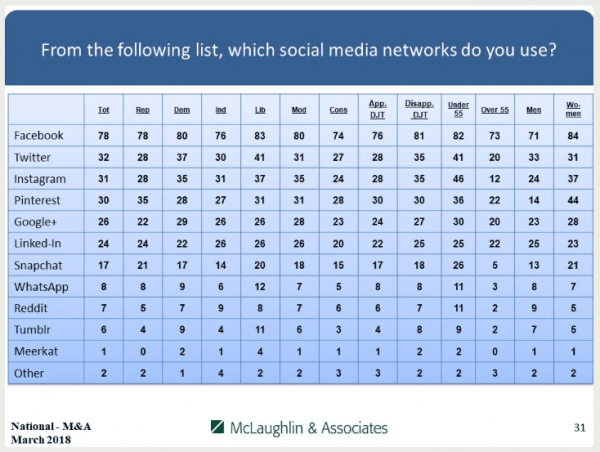
Like most things in a free society, innovations arise, products are patented by inventors, and media mavens go adrift. Is it time that Facebook’s father Mark Zuckerberg start bailing water his vessel has taken on? Can lawmakers reel-in the social media guru and hold him accountable for the 50-million Facebook users’ data betrayal? Are we looking at intellectual property violations? Elections tampering? Identity theft too much of a stretch?
In any case, we all have the power. And that ultimate power has everything to do with choice. We can go where we wish to go. Patronize who we wish to patronize. And we can always take our eyeballs to any screen based on our predilections and the political climates in which we entrust governance and American resolve.
Speaking of resolve, where does Zuckerberg go from here? Is Facebook guilty of political polarization, operating left-handed and myopically?
















